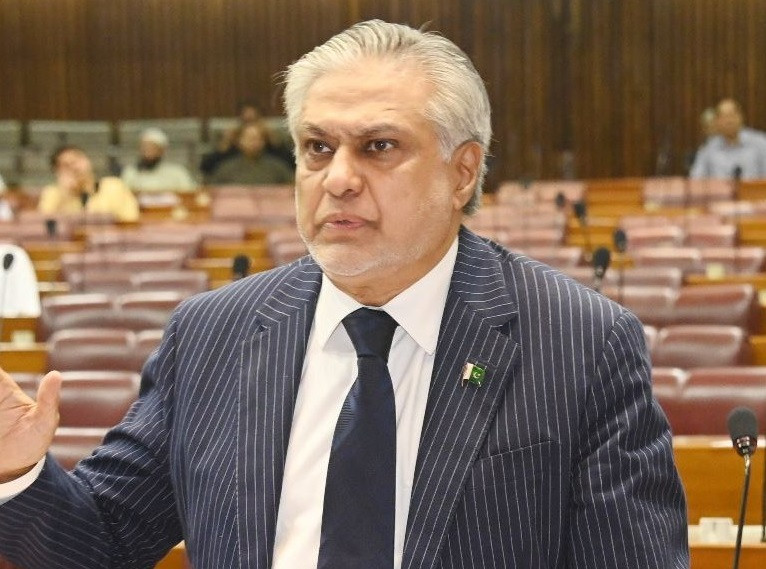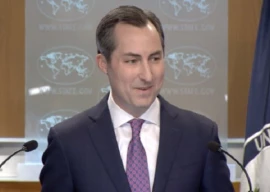
The National Assembly passed the Finance Bill 2023-24 on Sunday with certain amendments to the proposed budgetary measures with the revised outlay of Rs14.48 trillion.
The new measures included Rs215 billion additional taxes through amendments to the original bill, which was presented on June 9. The bill set a target of 3.5% growth rate in gross domestic product (GDP).
The house passed the bill, moved by Finance Minister Ishaq Dar, with a majority vote. The house echoed with thumping of the desks as the budget was approved. Now, after the approval of the president, the Finance Act will take effect on July 1.
The budget was approved a day after Dar announced fiscal adjustments worth Rs300 billion, including fiscal tightening measures as demanded by the International Monetary Fund (IMF) in a final push to clinch a much-delayed rescue package.
The new measures announced by Dar, while winding up the budget debate included increasing tax burden on the salaried class and withdrawing the $100,000 asset-whitening scheme, suggesting that the government accepted majority of the IMF demands.
According to the approved Finance Bill, the revenue collection target of the Federal Board of Revenue (FBR) had been revised upward to Rs9,415 billion in the wake of Rs215 billion new taxes.
The house approved increases in the funds allocation to the pensions of retired government employees; the National Finance Commission (NFC) award for the provinces and the allocation for the Benazir Income Support Programme (BISP).
A 2.5% tax was levied on the annual income of Rs2.4 million; tax on sale and purchase of property was increased from 1 to 2%; 5% federal excise duty (FED) on fertiliser and the FED on juices was increased from 10 to 20%.
By amending the Petroleum Development Levy Ordinance, the limit of petroleum development levy (PDL) was increased from Rs50 per litre to Rs60 per litre.
Rs2,000 tax was levied on old-technology fans besides 20% tax on old bulbs from January 1.
Amendments to the finance bill pertaining to the formation of a three-member committee for the resolution of disputes relating to 62,000 pending cases that involved Rs3,200 billion, were also approved.
According to the revised figures, the funds for the pensions were increased from Rs761 billion to Rs801 billion; NFC Award from Rs5,276 billion to Rs5,390 billion; and the BISP allocation was increased from Rs459 billion to Rs466 billion.
A total of nine amendments – eight from the treasury benches and one from the opposition – were proposed in the Finance Bill which were approved. The house rejected a proposal from Maulana Abdul Akbar Chitrali of the Jamaat-e-Islami (JI).
Chitrali demanded that the Finance Bill be sent to the Council of Islamic Ideology (CII), saying that it was based on usury system. By approving the bill, he said, the government was going against the Federal Shariat Court's (FSC) decision of abolishing usury.
Chairing the session, Speaker Raja Pervaiz Ashraf presented the proposal for voting. On that all the government and opposition members, barring Chitrali, opposed the demand for sending the Finance Bill to CII to seek its opinion.
The house also passed the supplementary budget of over Rs1,581 billion – more than 973 billion for the fiscal 2021-22 and Rs608 billion for the fiscal 2022-23. On the occasion, Dar announced the honorarium for the staff on duties in the budget session.
One pension
During the session, Dar clarified that there would be no double pension for the government officers falling in grades 17 to 22. However, he added, that the restriction would not apply to the government employees below Grade 17.
Responding to a point raised by Water Resources Minister Syed Khursheed Shah, the minister explained that if some officers were working on a contract basis after retirement, they would have to choose one pension that suited them.
Dar pointed out that there was no specific timeframe for pension payments to the dependents of retired employees and widows after their passing. However, this had now been limited to 10 years.
He stressed that such reforms were crucial because the pension budget had reached Rs800 billion, which was nearly 50% less than the current figure a few years back. He warned that without these reforms, pensions would become unsustainable.
Addressing concerns raised by Ghous Bux Mahar of the Grand Democratic Alliance (GDA) regarding the withdrawal of the urea subsidy, the minister stated that the government aimed to promote local fertiliser production.
He mentioned that several Pakistani companies were planning to invest over $200 million in the urea production sector. He assured the house that the challenges facing the agriculture sector would be addressed in due course through consultation.
Communication Minister Asad Mehmood urged the government to thoroughly review the merger of the Federally Administered Tribal Areas (Fata) in light of the ongoing challenges facing by the region.
The minister underscored the need for ascertaining the desire of the people of Fata through a referendum. He added progress has been observed in the Fata areas, but it was crucial to obtain first-hand information about the issues faced by the local population.
Maulana Chitrali rejected the budget, saying that the house had not been taken into confidence over the new taxes. He added that the budget would unleash a storm of inflation in the country.
Towards the end of the session, only one member from the opposition benches, Maulana Chitrali and just 62 treasury lawmakers were present in the house. Later, the speaker adjourned the session until Monday evening.
(WITH ADDITIONAL INPUT FROM APP)

1732603002-0/lamar-(4)1732603002-0-405x300.webp)
1720420084-0/brad-pitt-(2)1720420084-0-165x106.webp)





1732600231-0/BeFunk_§_]__-(50)1732600231-0.jpg)









COMMENTS (6)
Comments are moderated and generally will be posted if they are on-topic and not abusive.
For more information, please see our Comments FAQ